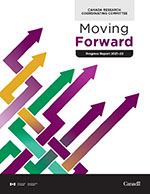Moving Forward: Canada Research Coordinating Committee Progress Report 2021-22
Minister of Innovation, Science and Industry
© His Majesty the King in Right of Canada,
represented by the Minister of Industry, 2022
Cat. No. CR1-17E-PDF
ISSN 2563-7444
On this page
- Canada Research Coordinating Committee at a glance
- Canada Research Coordinating Committee priorities
- Message from the Ministers
- Message from the Chair
- Priority: Increasing engagement in interdisciplinary, international, high-risk/ high-reward, rapid-response research
- Priority: Position Canada as a valuable partner in global research and innovation
- Priority: Fostering Indigenous self-determination, leadership and capacity in research and training
- Priority: Strengthening equity, diversity and inclusion in research
- Priority: Supporting early career researchers
- Priority: Tri-agency Training Strategy
- Annexes
In 2021-22, Canada Research Coordinating Committee (CRCC) member organizations worked diligently to help sustain the country’s research enterprise through the second year of the global pandemic. At the same time, they kept a keen eye to the future: working closely together to build a strong, more equitable, connected and innovative research community to empower Canadian research in the years ahead.
CRCC at a glance
The Canada Research Coordinating Committee (CRCC) works to actively coordinate and strengthen the policies and programs of Canada’s three federal research funding agencies and the Canada Foundation for Innovation in order to advance federal research priorities. It serves as Canada’s strategic forum for sharing information, building consensus and making decisions on forward-looking initiatives that strengthen Canada’s research enterprise.
Committee members

Alejandro Adem
Chair, 2021 and 2022
President, Natural Sciences and Engineering Research Council

Ted Hewitt
Vice-Chair, 2021 and 2022
President, Social Sciences and Humanities Research Council

Simon Kennedy
Deputy Minister, Innovation, Science and Economic Development Canada

Stephen Lucas
Deputy Minister, Health Canada

Mona Nemer
Chief Science Advisor, Office of the Chief Science Advisor of Canada

Roseann O’Reilly Runte
President and Chief Executive Officer, Canada Foundation for Innovation

Iain Stewart
President, National Research Council Canada
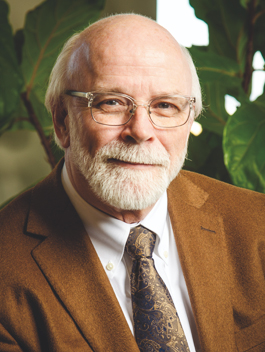
Michael Strong
President, Canadian Institutes of Health Research
CRCC priorities
In 2021-22, CRCC member agencies and departments worked together on five shared priorities. Efforts to address and recover from the impacts of the COVID-19 pandemic continued in all five areas and a new priority initiative was launched on research training.
| Interdisciplinary, international, high-risk / high-reward, rapid-response research | International cooperation | Indigenous research and reconciliation |
|---|---|---|
Foster world-leading discovery and innovation |
Position Canada as a valuable partner in global research and innovation |
Advance reconciliation and help build research capacity by working with Indigenous communities on new models for Indigenous research and research training |
| Equity, diversity and inclusion | Early career researchers | *NEW* Tri-agency training strategy |
Achieve excellence by engaging the full pool of diverse research talent in an equitable and inclusive research ecosystem |
Develop the next generation of talent and encourage innovation by engaging early career researchers in Canada’s research ecosystem |
Support, inspire and empower the next generation of leaders, within and beyond the research ecosystem, for the benefit of Canada |
A strategic forum
As a strategic forum for members to share information and advice on issues of importance for Canadian research, the Committee met with the leaders of other federally funded research organizations and engaged discussions on a wide range of topics in 2021-22. These included the priorities above, as well as open science, research security, climate change, pandemic recovery, research training, major research facilities, international collaboration and public trust in science.
Message from the Ministers

The Honourable François-Philippe Champagne
Minister of Innovation, Science and Industry

The Honourable Jean-Yves Duclos
Minister of Health
Supporting strong and vibrant researchers coming up with innovative and evidence-based solutions is at the heart of our government’s priorities, and even more so in our efforts to recover from the COVID-19 pandemic and build a more resilient, inclusive and prosperous Canada.
When it mattered most, our research community adapted, pivoted and worked in tandem to respond to this challenge by leveraging their collective knowledge into discoveries and solutions. On behalf of the Government of Canada, we are grateful to the world-class researchers who are leading our country toward a long-lasting recovery. With a diverse and thriving research community, we are driving an innovative economy, building a healthier, more resilient future, and training the next generation of leaders.
We also wish to thank the organizations represented on the Canada Research Coordinating Committee (CRCC). Working together, they addressed national priorities, including the innovations needed to advance research during the pandemic; inspired Canadian leadership in transformative international projects; encouraged the growth of a more equitable, diverse and inclusive research community; and worked collaboratively with First Nations, Inuit and Métis Peoples to advance their research priorities. We are also truly grateful for the work of the federal research granting agencies, which stepped up to support Ukrainians in the research community by ensuring they would be able to continue their important work here in Canada.
This report highlights the key contributions that the CRCC member organizations made to support Canada’s research enterprise over the past year. Reflecting on their accomplishments, we look forward to continuing our work with them in the year ahead.
Message from the Chair

Alejandro Adem
Chair, Canada Research Coordinating Committee
In 2021-22, Canadian researchers continued to bend their collective efforts to overcome the challenges posed by COVID-19. At the same time, they found ways to adapt, innovate and advance research in all fields for the health and well-being of Canadians.
In much the same way, Canada’s federal research funding organizations worked together to support research adapted to pandemic realities and international projects essential for a sustainable recovery. We also continued to move forward: to help create a more equitable, diverse and inclusive research enterprise; to support Indigenous-led research; and to inspire Canadian researchers to lead transformative projects that reimagine approaches to global challenges.
Like many organizations, we have drawn lessons from the pandemic experience. We saw how it exacerbated difficult circumstances for researchers and students, and coordinated efforts to mitigate the impact on them. Recognizing the increasingly precarious status of graduate students and postdoctoral fellows, we also launched an initiative to develop a more equitable, accessible and effective suite of scholarships and fellowships for our next generation of research leaders. Similarly, the pandemic highlighted the importance of international collaboration in addressing global problems. So, we have worked together to broaden our international networks and lay the groundwork for future international efforts.
Perhaps most importantly, our experience has proven the value of sharing information and advice on key issues across the federal research enterprise. As we emerge from the pandemic, I am confident that our committee will continue to serve in this way, as a resource for our organizations and a strategic forum for Canada’s research enterprise.
It has been a pleasure to work with my CRCC colleagues and staff in all member agencies and departments this year as we strive to strengthen Canadian research together. My greatest pleasure, however, has been to see the energy and initiative of researchers across Canada who have taken their work to new heights. They are realizing our best hopes for the future.
Alejandro Adem
Chair, Canada Research Coordinating Committee
President, Natural Sciences and Engineering Research Council of Canada
Priority: Increasing engagement in interdisciplinary, international, high-risk / high-reward, rapid-response research
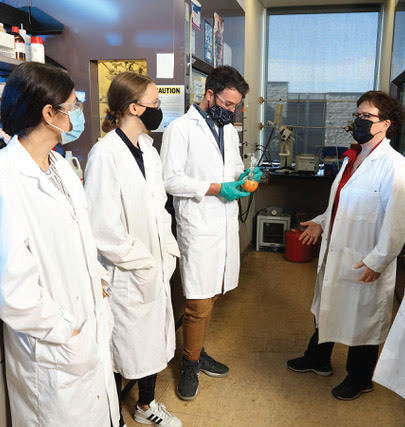
New Frontiers in Research Fund Transformation 2020 research project Protection of Metallic Surfaces from Bulk to Nano Through Molecular-Level Innovation
This team of researchers seeks to develop a new approach to the protection of metal surfaces by developing carbon-to-metal coatings with unprecedented strength and resistance to oxidation. This unique technology will assist manufacturing, automotive, shipping and aerospace industries, while opening markets in green energy, microelectronics manufacturing and nanomedicine approaches to precision cancer treatments.
Photo used by permission
Opening new frontiers
The New Frontiers in Research Fund (NFRF) is designed to support world-leading innovation through three distinct funding streams and occasional special calls. Last year, the first-ever Transformation stream grants were awarded to support large-scale, Canadian-led international and interdisciplinary research with the potential to create real and lasting change.
In total, $144 million was awarded to seven six-year interdisciplinary projects that will challenge current paradigms, develop novel approaches and promise ground-breaking impact. These initial Transformation projects include research to preserve donor organs longer and improve recipients’ tolerance during organ transplantation; to repurpose marine byproducts and wastes to create valuable new products; to advance inclusive workplace design for persons with disabilities; to use DNA sequencing to track changes in the Earth’s biosphere; to apply Indigenous knowledge to the stewardship of biodiversity internationally; to develop new methods to repair spinal cord injuries; and to protect all metals from rust, permanently.
COVID-19 recovery
In 2021-22, NFRF issued two special calls. The first awarded 90 grants to projects designing innovative approaches to research interrupted by pandemic-related restrictions. The second will support international teams responding to the priorities of the UN’s Research Roadmap for the COVID-19 Recovery, which encourages “targeted research for data-driven responses that focus particularly on the needs of people being left behind.”
Fuelling the drive to discover
Through the NFRF Exploration stream, $25 million was awarded to 102 high-risk, high-reward interdisciplinary projects. Since 2018, more than 500 Exploration grants have been awarded — with more than 300 going to early career researchers to help launch their careers.
In all NFRF streams, project teams must articulate a commitment to equity, diversity and inclusion (EDI) in research — embedding EDI considerations directly into the evaluation process so teams consider these from the outset and adopt them as standard practice going forward in their research design and practice.
The exploratory and transformational research enabled by NFRF helps researchers redefine our understanding of the world, with benefits for generations to come.
$144 million
awarded to transformative projects with potential for global impact
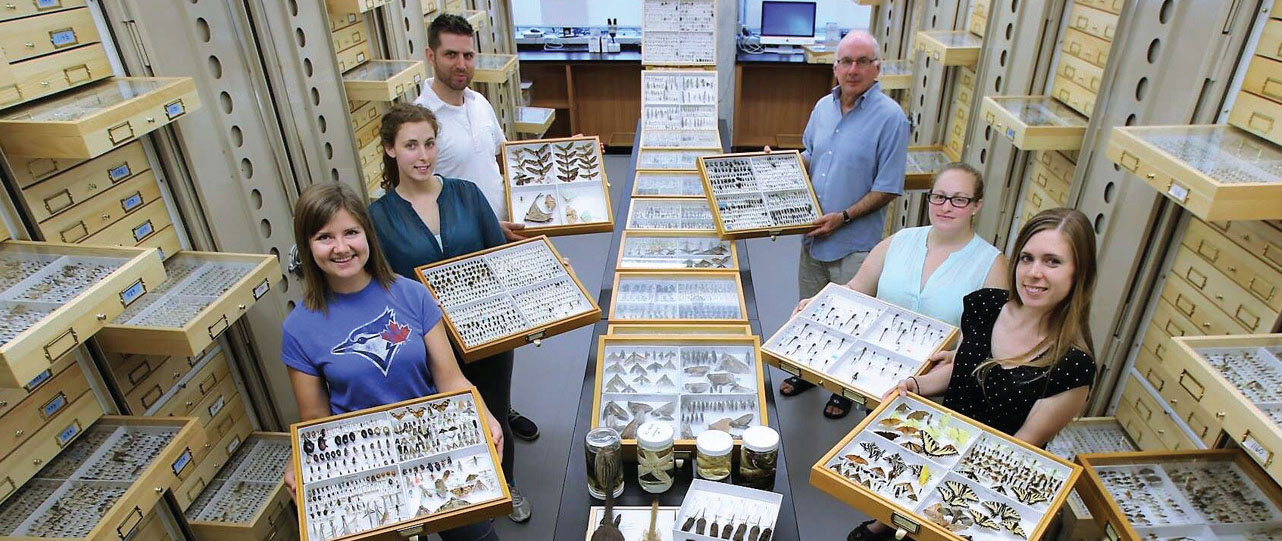
New Frontiers in Research Fund Transformation 2020 research project BIOSCAN: Tracing the Patterns of Life on a Changing Planet
This interdisciplinary team analyzes sequence diversity in targeted gene regions (DNA barcodes) to create a system that allows anyone to identify any species. Its work will allow biodiversity scientists to extend the barcode library, probe species interactions, and study shifts in species distribution and abundance in response to global change.
Photo used by permission
Priority: Position Canada as a valuable partner in global research and innovation
Fostering international dialogue and cooperation
Recognizing the heightened importance of international collaboration in the pandemic context, CRCC members helped broaden Canada’s global research and innovation networks in 2021-22 by collectively engaging with international research funding organizations to share information and perspectives on the drivers of national and global research agendas and discuss potential areas for cooperation.
The CRCC met with the chief executives of France’s Centre national de la recherche scientifique (CNRS), the Deutsche Forschungsgemeinschaft (German Research Foundation) and the US National Science Foundation (NSF). Building on the international activities of individual member organizations, these meetings created opportunities to strengthen international cooperation across the federal research enterprise, exchange strategic information on shared priorities and advance collaboration.
11 federally funded research organizations
came together for CRCC-hosted meetings with research funders from France, Germany and the United States
For example, during a meeting with the CRCC, NSF signed a memorandum of understanding with NSERC that supports fundamental discovery research in the US and Canada. In addition to paving the way for new collaborations between the two countries’ research communities, this partnership will foster a shared commitment to equity, diversity and inclusion (EDI) in the research enterprise.
Sustained engagement to advance shared goals
Following an earlier CRCC-UK Research and Innovation (UKRI) meeting, member organizations in both countries joined forces to plan a professional workshop on EDI to be held in 2022-23. The workshop will focus on efforts underway on both sides to promote more equitable, diverse and inclusive research cultures, and to establish valuable connections to facilitate future collaborations in this area.
“International collaboration and equitable partnerships are vital to the delivery of UKRI’s strategy and the challenges we face. The CRCC-UKRI partnership is a great example of how to work together to achieve common goals, including implementation of EDI policies/practices and working toward Net Zero. UKRI looks forward to building on the great work done with the CRCC.”
Recognizing that multiple perspectives are required to tackle complex, transboundary problems, the CRCC is committed to broadening Canada’s research networks and enhancing opportunities for collaboration with diverse partners around the world.
COVID-19 recovery
Sustained engagement with international partners creates avenues to address challenges that require global cooperation, such as the COVID-19 pandemic and climate change. Over the past year, the CRCC deepened this engagement through virtual meetings and collaboration, at many levels, with counterparts from France, Germany, the United Kingdom and the United States.
Priority: Fostering Indigenous self-determination, leadership and capacity in research and training
Strengthening Indigenous research capacity
In February 2022, the CRCC released the first progress report on the implementation of the interagency strategic plan on Indigenous research and research training.
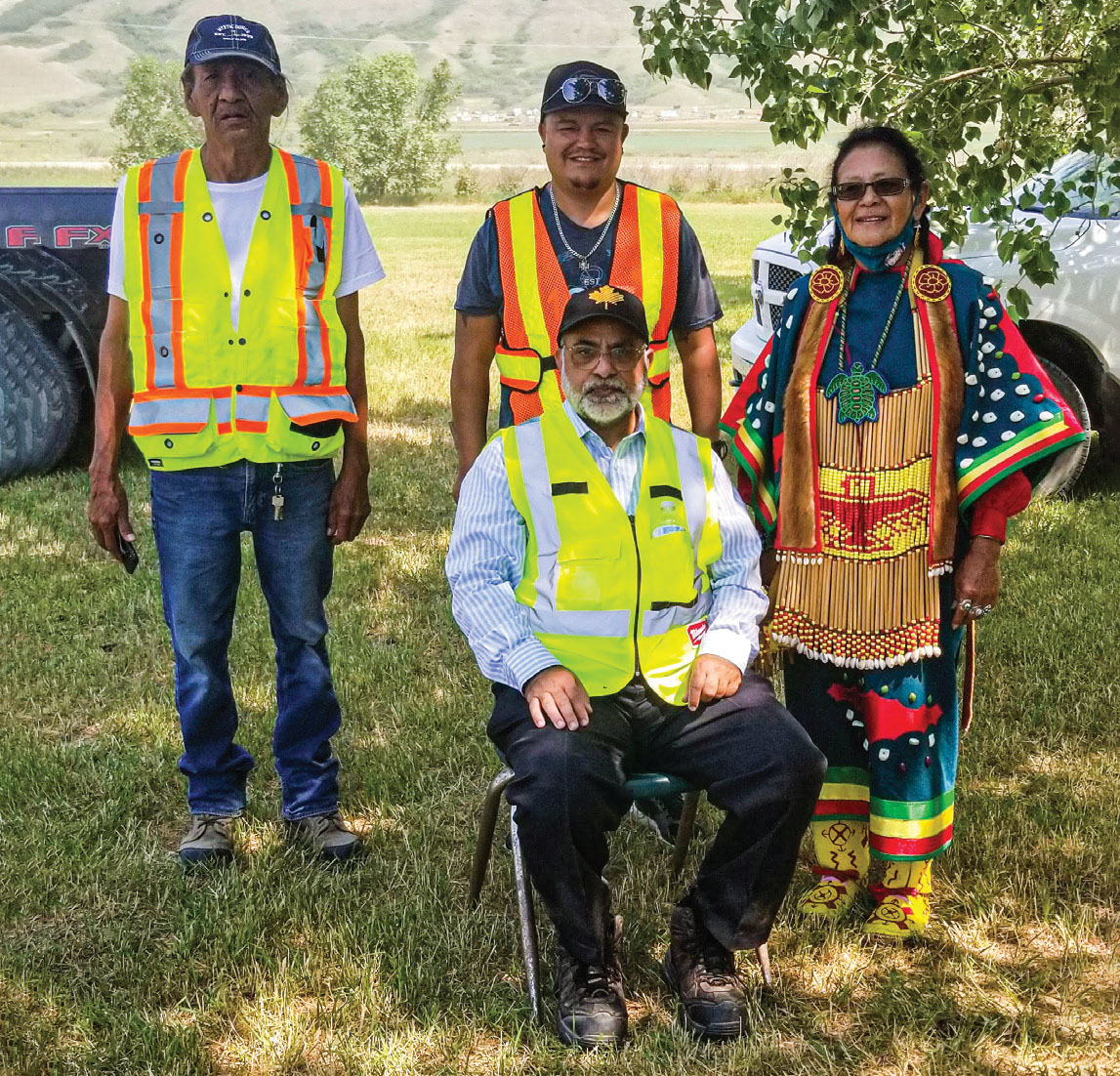
Cowessess First Nation community members worked together with a research team from Saskatchewan Polytechnic on the Remote Sensing of Residential School Cemeteries project, funded through the tri-agency College and Community Innovation Program.
From left to right (standing): Cowessess First Nation project facilitators Conrad Obey and Josh Aisaican and Elder and band council member Debbie Delorme. Sitting: Abdul Raouf, Saskatchewan Polytechnic’s team lead.
Photo Credit: Abdul Raouf
The report, Building the Foundation, highlights the critical role Indigenous scholars, community leaders, Knowledge Keepers, Elders and youth played in shaping the strategic plan — and in building the community that will guide its implementation as part of the interagency collaborative initiative Strengthening Indigenous Research Capacity (SIRC).
The Reference Group for the Appropriate Review of Indigenous Research is a fundamental part of this community. Its work over the past year laid the groundwork for a review of the agencies’ peer assessment models guided by principles of cultural relevance, cultural safety, respect for Indigenous knowledge systems and self-determination in research. In this spirit, the Reference Group launched an open call for expressions of interest to engage more closely with Knowledge Keepers and Elders to ensure that the group’s work and deliberations are guided by a deep understanding of Indigenous ways of knowing and being.
In collaboration with Indigenous partners, the federal research granting agencies reached another major milestone by setting up the Indigenous Leadership Circle in Research (ILCR). Composed of individuals from First Nations, Inuit and Métis communities, the ILCR will oversee implementation of the plan and advise the agencies on matters related to Indigenous research. Using the model developed for the establishment of the Reference Group, ILCR members were selected by an Indigenous expert panel that took into consideration their commitment to Indigenous research, their community engagement and the diversity of voices across First Nations, Inuit and Métis communities. The ILCR will start its mandate and meet with the members of the CRCC in 2022.
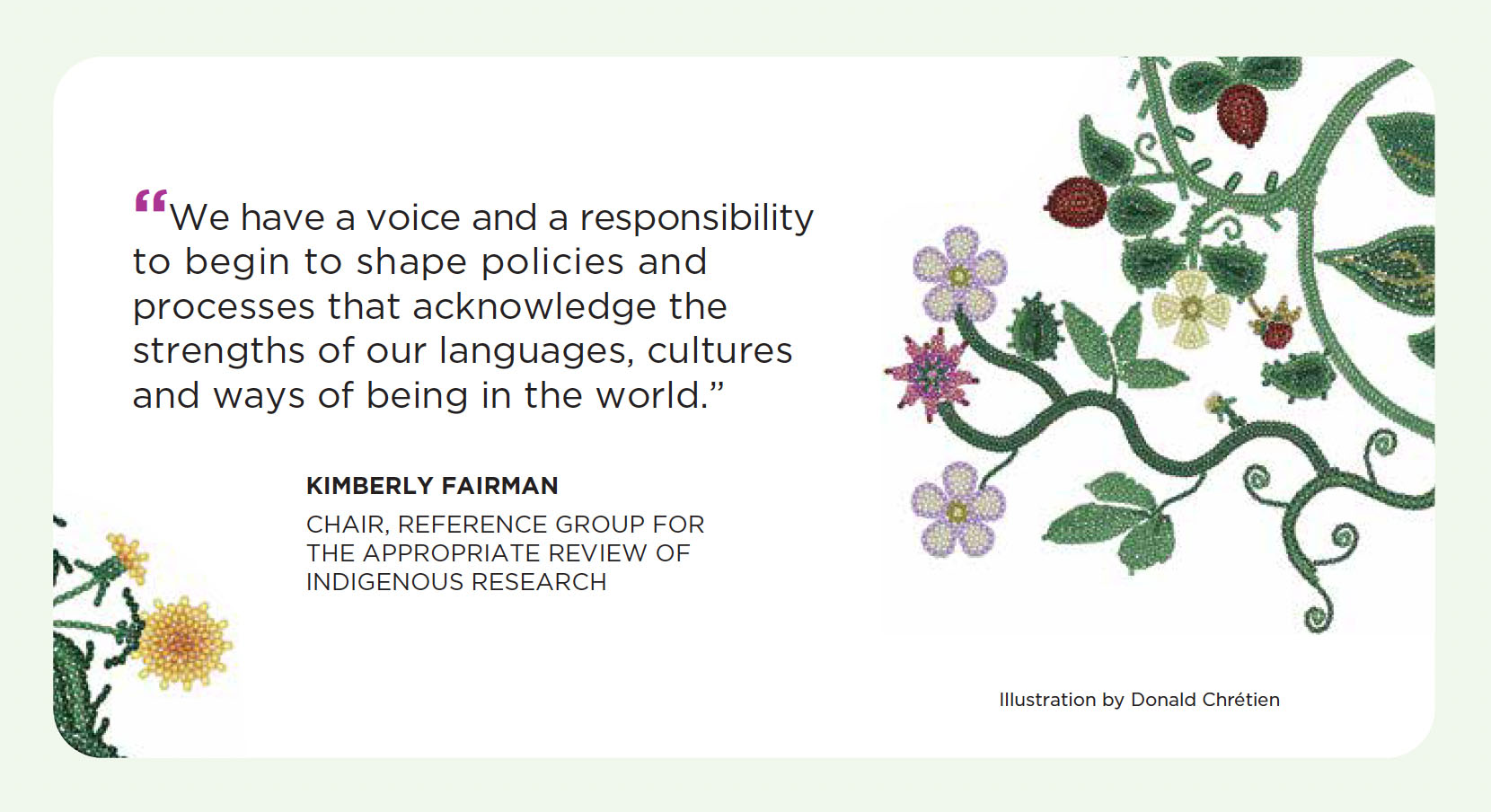
“We have a voice and a responsibility to begin to shape policies and processes that acknowledge the strengths of our languages, cultures and ways of being in the world.”
Illustration by Donald Chrétien
COVID-19 recovery
While the COVID-19 pandemic undeniably slowed the progress of the SIRC initiative, important foundational work was achieved through continued engagement with the community of Indigenous youth, scholars, leaders and Elders that will guide the implementation of the Indigenous research and training strategy.
Advancing Indigenous research priorities
12 meetings
have been held by the Reference Group for the Appropriate Review of Indigenous Research since its inception in 2020
The three research funding agencies and the NRC also pursued collaborative initiatives with Indigenous-led organizations to support their research priorities and objectives.
CIHR encouraged distinctions-based engagements and initiatives through directed grants, co-developed with Indigenous organizations and tailored to address Indigenous health issues. Examples of this are the First Nations Biobanking and Genomic Research Initiative and the Inuit Research Network (IRN) Grant. The IRN Grant builds on the memorandum of understanding (MOU) and shared workplan between Inuit Tapiriit Kanatami (ITK) and CIHR.
In 2022, the Indigenous Leadership Circle in Research will start its mandate. It will advise senior management at the three federal research funding agencies and the CFI on the implementation of the interagency strategic plan on Indigenous research and research training.
In 2021, ITK and NSERC co-developed a draft five-year workplan based on a MOU signed in 2020 to advance key objectives of the National Inuit Strategy on Research, including the improvement of Inuit governance in research and the alignment of funding with Inuit research priorities. In March 2022, the National Centre for Truth and Reconciliation (NCTR) and SSHRC launched the Partnership Engage Grants—Residential Schools Joint Initiative to support Indigenous community-led research and related activities involving community decision-making processes, research and actions regarding residential school sites in Canada. This joint initiative was made possible by a partnership agreement between the NCTR and SSHRC, which pursues work to address the Truth and Reconciliation Commission’s Call to Action 65 and supports calls 71 to 76.
The NRC, with ITK, UKRI, Polar Knowledge Canada, Parks Canada and Fonds de recherche du Québec, co-developed the Canada-Inuit Nunangat-United Kingdom Arctic Research Programme (CINUK). The research funded under CINUK focuses on changing Arctic ecosystems and their impacts on Inuit communities, ensuring alignment with the National Inuit Strategy for Research and Canada’s Arctic and Northern Policy Framework.
Priority: Strengthening equity, diversity and inclusion in research
Fair Access and Equitable Participation
COVID-19 highlighted existing inequities in Canada’s research ecosystem. In 2021-22, CRCC members took steps to gather better data and gain a deeper understanding of the disparities facing underrepresented groups within the research ecosystem.
17 more postsecondary institutions
committed to embed EDI in their policies and processes by endorsing the Dimensions Charter, bringing the total number of signatories to 141
As part of that effort, CRCC member organizations revised the self-identification form that is provided to people who participate in agency funding programs to gather disaggregated data. When analyzed, the data will help identify potential bias and inequities in the agencies’ policies and programs and support evidence-based decisions that promote equity, diversity and inclusion (EDI) in the funding system. Some CRCC member organizations completed the rollout of the expanded form this year while other members are working to complete this process in the coming year.
April 2021 saw the public release of a revised 2018-25 Tri-Agency EDI Action Plan, which outlines measures to increase fair access to agency funding opportunities and promote equitable and inclusive participation in the Canadian postsecondary research system. Another 17 postsecondary institutions and research organizations committed to embed EDI principles in their policies by signing the Dimensions Charter. As the year progressed, CIHR and SSHRC began public engagements to inform antiracism action plans, and the tri-agencies started working on plans to enhance accessibility in the research funding system.
Diversity among Canada’s Research Chairs
By pursuing a collective EDI action plan, the tri-agencies continue to identify—and remove—barriers for underrepresented groups in the research system.
These underrepresented groups include, but are not limited to, women, Indigenous Peoples (First Nations, Inuit and Métis), persons with disabilities, members of visible minorities and LGBTQ2+ communities.
For additional information and data, see the EDI data annex
In 2021, it became a requirement for institutions that participate in the Canada Research Chairs Program to set population-based equity targets to ensure representation of visible minorities, Indigenous Peoples, women and persons with disabilities aligns with Canada’s diversity. The program also provided an EDI stipend of $50,000 to help participating institutions develop and implement institutional EDI action plans for the program. The Robbins-Ollivier Excellence in Equity Award launched in March 2022 will grant three $100,000 awards to three individuals or teams of individuals for bold and potentially game-changing projects that challenge the status quo, spark change and address persistent systemic barriers in the research ecosystem and academia.
COVID-19 recovery
Recognizing that emerging from COVID-19 presents an opportunity to “build back better” across the research ecosystem, the cohort of 17 institutions co-developing the Dimensions program are placing the voices of those who have experienced inequities, underrepresentation and exclusion at the centre of their evidence-based engagement strategies and action plans.
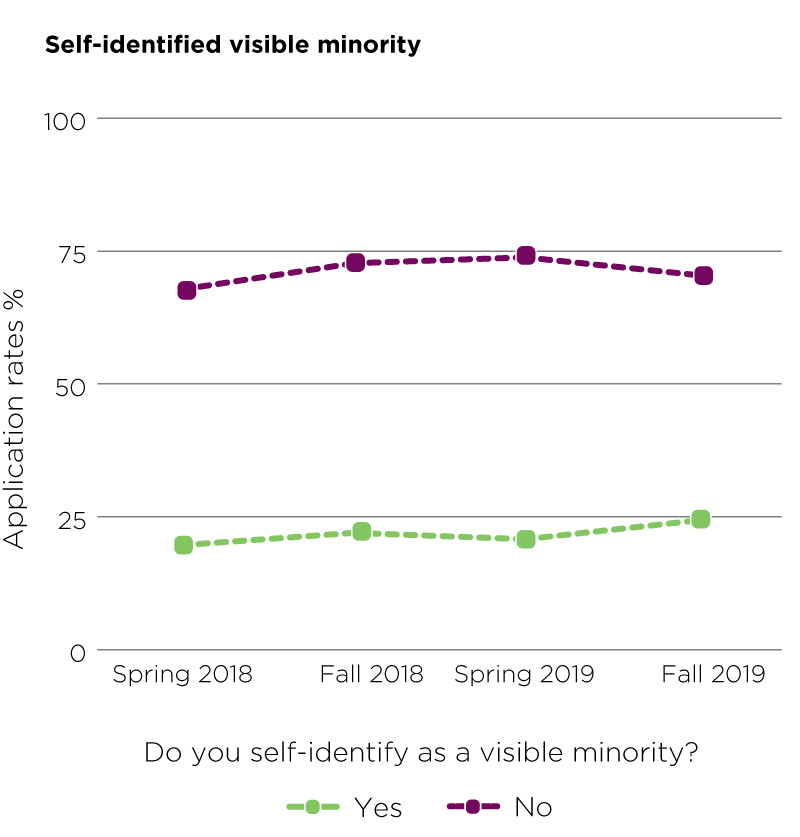
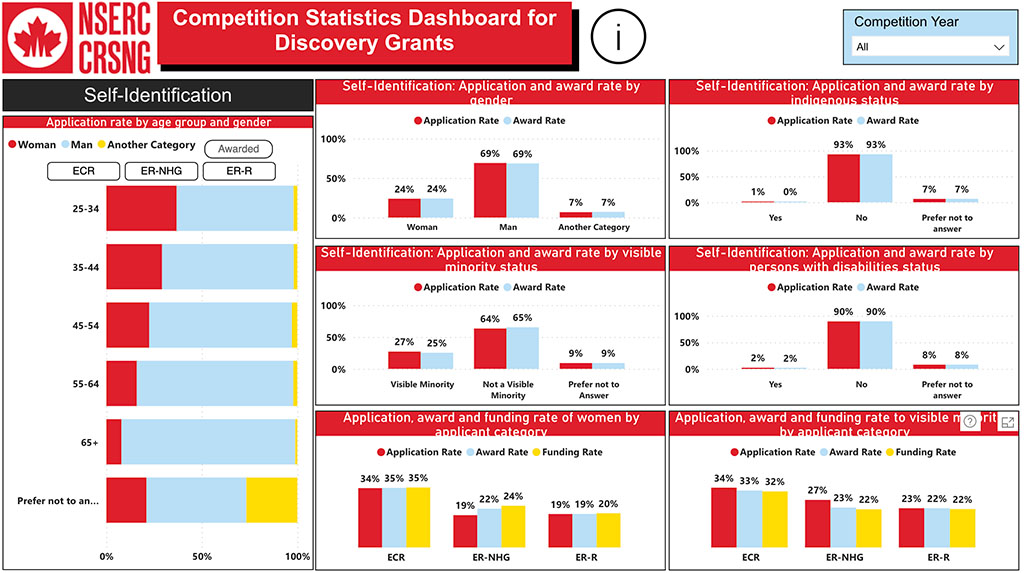
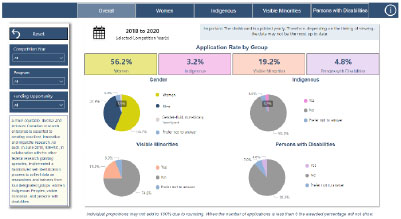
The three federal research funding agencies gather data to gain a deeper understanding of the disparities facing underrepresented groups within the research ecosystem. The data can be found on each of the tri-agencies’ respective websites.
Priority: Supporting early career researchers
Research capacity for tomorrow
The three federal research funding agencies and the CFI are committed to supporting early career researchers (ECRs), recognizing the vital role they play in research innovation and the unique challenges they face establishing research careers.
A foundation for career-long success
80% of peer reviewers on CIHR’s Fellowship Awards committees were early career researchers
Merit review is central to funding research excellence — and is a learned skill. The three agencies and the CFI offer several pathways that provide ECRs with peer review opportunities. These include the CIHR Awards Review program and the CIHR Reviewer in Training program, which help ECRs develop their skills through hands-on peer review and strengthen their own research proposals.
In addition, ECRs are included in NSERC grant selection committees and postdoctoral fellows (PDFs) are included in NSERC scholarship and fellowship committees. At SSHRC, ECRs are included in merit review committees and PDFs in scholarship and fellowship merit review committees.
Safeguarding ECR futures
All CRCC member organizations are committed to creating opportunities through funding and training for early career researchers to strengthen and support the future research ecosystem.
For additional information and data, see the ECR data annex.
In addition, the funding agencies continued to mitigate the impacts of the pandemic by extending measures introduced in 2020-21. NSERC guidelines for assessing pandemic impacts on ECRs were used throughout the year, while SSHRC included consideration of the pandemic’s impact on research plans in the review of Insight Grant and Insight Development Grant applications. It allowed all applicants — including ECRs — to describe pandemic-related slowdowns or interruptions. CIHR enabled Project Grant applicants to outline the impact of specific factors, including the pandemic, on their research progress as part of the review process.
The CFI’s John R. Evans Leaders Fund is often used by institutions to attract new researchers and assist young researchers in building their research portfolios. The introduction of co-leads to the CFI’s Innovation Fund competition has resulted in a significant increase in projects led by ECRs. The CFI continues to encourage the inclusion of ECRs.
COVID-19 recovery
In 2021-22, many early career researchers and their work were affected by ongoing pandemic-related challenges such as loss of access to research facilities and resources. The three federal research funding agencies offered mechanisms to extend the eligibility window for individuals to be considered early career researchers where it was beneficial for them to do so.
Priority: Tri-agency Training Strategy
Research Talent for a Knowledge-Based Society
Advanced research training for people in all sectors provides an essential foundation for Canada’s ever-growing knowledge-based society and economy. Already, more than 80% of Canadian doctoral graduates are employed outside academe, in business, government and non-governmental organizations.
With this in mind, the CRCC asked the three federal research funding agencies to propose a new Tri-agency Training Strategy to deliver an internationally competitive, equitable, accessible and effective suite of scholarships and fellowships to help support and prepare a diverse population of students and postdoctoral fellows for careers requiring strong research skills in all sectors. Development and implementation of the strategy will be guided by an external advisory committee to ensure it addresses the current and future needs of students, postdoctoral fellows and postsecondary institutions.
